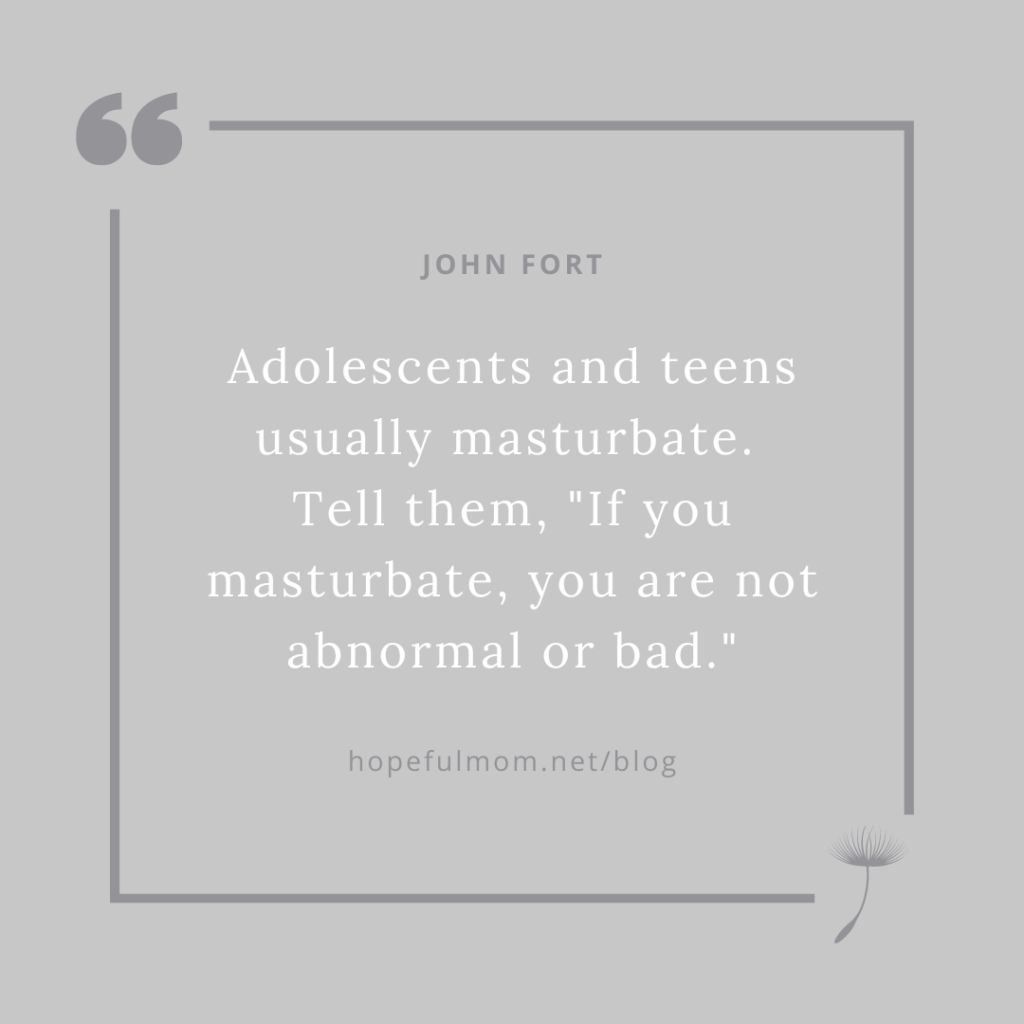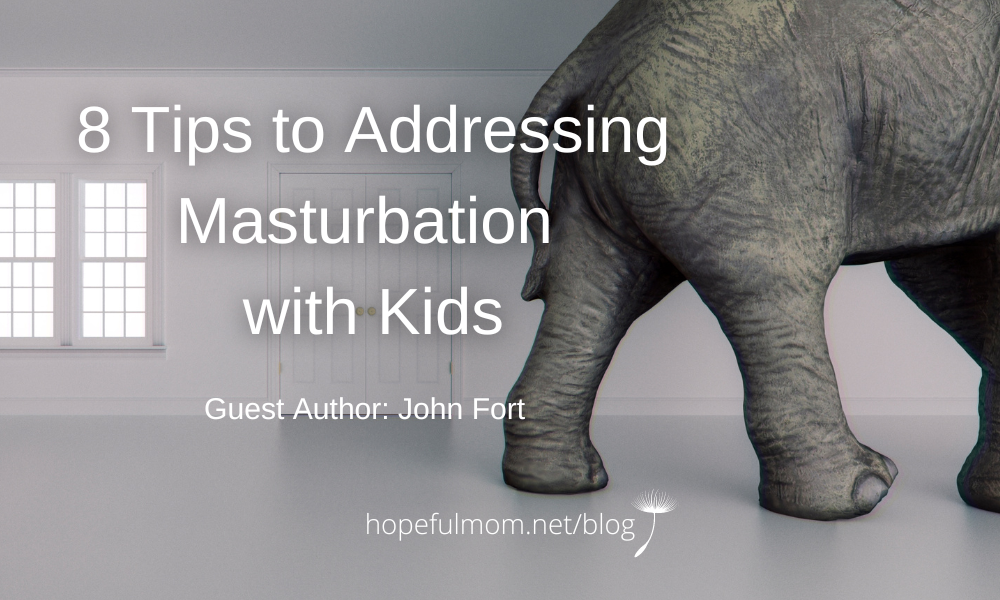I’m thrilled to have John Fort of Be Broken Ministries back with us. This time he’s talking about masturbation. I have to admit this subject is still difficult for me to address, so I’m grateful John is willing to give us some suggestions. Read to the end for more resources, and check out his bio for information regarding his newly-revised book.
When I speak to parents on subjects related to talking with kids about sex or pornography, I always know I will be asked one question during Q&A. That question is, “What are we supposed to say about masturbation?” Before I answer, my own question would be, what is it about masturbation that seems to cause so much anxiety among Christian parents? I believe parents carry some level of baggage related to their own past that plays into fears about their kids.
Baggage
Some parents are like me where masturbation as an adolescent was deeply intertwined with pornography use and sexual fantasy. Masturbation was a tool I used to hide from difficult feelings and it became addictive. Other parents have a spouse who still struggles to give up masturbation, even after marriage. To such a person, masturbation may be viewed as a form of betrayal or a fear that they are not good enough for their spouse. Still others have no experience whatsoever with masturbation and simply cannot understand why an adolescent would want to continue to indulge in it.
You may feel fear, hurt, or confusion related to masturbation. As you work through your own feelings, be careful not to project them onto your child. You child is not you or your spouse and any experience with masturbation may affect them quite differently.
It Happens
The second thing to be aware of is that adolescents masturbate. It just happens. Surveys have been done for decades that show 96% of teenage boys admit to masturbating. In circles who study human sexuality the joke is, “And the other 4% are lying.” Similar surveys show that about 50% of women admit to masturbation as teen girls.
However, in most cases masturbation starts out of curiosity or even by accident when exploring their new body. A parent definitely does not want to place shame on a child for situations such as these.
Things to Avoid as a Parent
Any expectation or hope that your child will never masturbate is unhelpful to everyone.
It is also unhelpful to use the words “right” or “wrong” when discussing masturbation with an adolescent. Doing so misses the point teenagers need to understand.
Conversations to Have with Adolescents
The following is an excerpt from my book, Honest Talk: A New Perspective on Talking to Your Kids About Sex. These are good conversations to have with all children, boys and girls, as they enter puberty.

1. We can Talk About Masturbation
You will hear your friends talk about masturbation and you can bring your questions to me. This is no different than any other topic related to sex in that we can talk honestly about it.
2. Adolescents and Teens Usually Masturbate
If you masturbate, you are not abnormal or bad. Yes, masturbation can lead to problems, but masturbation does not define who you are or define your relationship with God. Talk about it with God and with us if you do masturbate as that will help remove shame.
3. Wet Dreams Happen to Teen Boys
This happens a lot with some boys and very rarely with others. When you have a wet dream, you may wake up in the middle of it and remember the sexual things going on in your dream. You are not a bad person because you dreamed a sexual dream. If you feel embarrassed or ashamed of what you dreamed, you should absolutely talk to God about it. You can even ask God to “clean your mind” of those images. You can also talk to your dad, as he knows what you just went through and can help.
4. Masturbation with Pornography or Sexual Fantasy is Harmful
Pornography use is harmful (the book goes into how in detail). Masturbation while looking at pornography or having a sexual fantasy locks those images into your mind and makes them very hard to forget. This is something we can work together to avoid.
Teens masturbate. It just happens. Talk with them about the normalcy, and when it's harmful – without shaming. For more information, read these suggestions by John Fort. 8 Tips to Addressing Masturbation with Kids #hopefulmom… Share on X5. Compulsive Masturbation is Harmful
Masturbating every day or more than once a day sets a bad pattern that will not help you.
- It can imprint your sexual attraction on things that are unhelpful to you.
- It teaches you to be impatient and to expect sex all the time, which will not happen in marriage.
- It prevents you from learning to deal with your emotions.
- It teaches you that sex is all about you rather than about giving to a spouse.
6. Masturbation is a Childish Response to Negative Emotions
Once pornography use is under control, you will probably find the main reason you masturbate is to feel better rather than face stress, anxiety, or disappointment. Masturbation does not help but only delays what you need to deal with. Growing up means learning to deal with unpleasant situations and feelings instead of masturbating to avoid them. We usually do this by talking about the feelings you have before they overwhelm you.
7. Moving Away from Masturbation is a Process
If stopping all at once does not work you can try reducing the frequency of masturbation. You should definitely remove pornography and fantasy from the equation. Reducing the frequency of masturbation does count as a step of maturity.
8. Talk to God About Masturbation
There is nothing God does not want to talk to you about. God wants you to talk to Him like a real person, not just ask Him for forgiveness and assistance. He wants you to talk to Him about your sexual feelings. You can talk to God about any times you have masturbated. You can ask God to help you find the emotions you may be hiding from when you masturbate. Real conversations like this are the most helpful. Then, if you feel like He is telling you something or giving you advice about masturbation, you should listen to what He says and trust it.
Talk is Good
Of course, if you do not talk with your child about masturbation they will have no guidance at all. Parents generally do guide their children in learning how to manage their emotions as they mature and managing sexuality, including masturbation, should be no different. You can start by having conversation #1 above any time.
Resources
You can read more on this subject in Honest Talk: A New Perspective on Talking to Your Kids About Sex.
For more in-depth information about masturbation and its relationship to pornography use, check out our resource: A Family Game Plan for Responding to Porn.
Thanks for reading. If you’ve found this information helpful, share it on social media. Subscribe below for post updates, information an upcoming parent support group (starting in October!) and my book that releases next summer. BONUS: a FREE resource: 7 Steps After Your Child Sees Porn.
About the author

John Fort
John Fort, MST, serves as Director of Training for Be Broken Ministries who help men, women, and families move from sexual brokenness to wholeness in Christ. John is also the parenting specialist at Be Broken, helping parents prevent and address issues related to pornography use and other unwanted sexual behaviors in children.
His background in biology, human health, and child development give him a unique voice to help parents assist their children to safely navigate our hyper-sexual world. Before working with Be Broken John was a high school science teacher for two years at Pan American Christian Academy in São Paulo, Brazil and a middle school science and health teacher for seven years in Oregon.
John is also a member of the Safeguard Alliance who are involved in reviewing, compiling, and organizing research on protecting children from exploitation. He is also a co-founder of the Sexual Integrity Leadership Summit, where national experts gather annually to discuss better methods of helping families strive toward sexual wholeness.
John also oversees online training for Be Broken on Pure Life Academy, is a regular blogger on CovenantEyes.com and ProtectYoungMinds.org and is the author of the books; Honest Talk: A New Perspective on Talking to Your Kids About Sex, Father-Son Accountability: Integrity Through Relationship, and the Forbidden Scrolls fictional trilogy.
John and his wife, Anna, live in Oregon and have two adult children.


